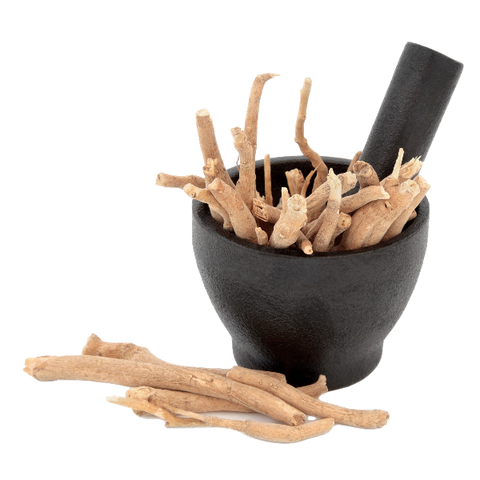ASHWAGANDHA
Ajagandha, Amangura, Amukkirag, Asan, Asana, Asgand, Asgandh, Asgandha, Ashagandha, Ashvagandha, Ashwaganda, Ashwanga, Asoda, Asundha, Asvagandha, Aswagandha, Avarada, Ayurvedic Ginseng, Cerise d'Hiver, Clustered Wintercherry, Ghoda Asoda, Ginseng Ayurvédique, Ginseng Indien, Hayahvaya, Indian Ginseng, Kanaje Hindi, Kuthmithi, Orovale, Peyette, Physalis somnifera, Samm Al Ferakh, Samm Al Rerakh, Sogade-Beru, Strychnos, Turangi-Ghanda, Vajigandha, Winter Cherry, Withania, Withania somnifera.
Overview Information
Ashwagandha is a small evergreen shrub. It grows in India, the Middle East, and parts of Africa. The root and berry are used to make medicine.
Ashwagandha is commonly used for stress. It is also used as an "adaptogen" for many other conditions, but there is no good scientific evidence to support these other uses.
Don't confuse ashwagandha with Physalis alkekengi. Both are known as winter cherry. Also, don't confuse ashwagandha with blue cohosh, canaigre, codonopsis, ginseng American, ginseng panax, or eleuthero.
Coronavirus disease 2019 (COVID-19): There is no good evidence to support using ashwagandha for COVID-19. Follow healthy lifestyle choices and proven prevention methods instead.
How does it work?
Ashwagandha contains chemicals that might help calm the brain, reduce swelling (inflammation), lower blood pressure, and alter the immune system.
Uses & Effectiveness
Possibly Effective for
- Stress. Some research shows that taking a specific ashwagandha root extract (KSM66, Ixoreal Biomed) 300 mg twice daily after food or another specific extract (Shoden, Arjuna Natural Ltd.) 240 mg daily for 60 days appears to improve symptoms of stress.
Insufficient Evidence for
- Metabolic side effects caused by antipsychotic drugs. Antipsychotics are used to treat schizophrenia but they can cause levels of fat and sugar in the blood to increase. Taking a specific ashwagandha extract (Cap Strelaxin, M/s Pharmanza Herbal Pvt. Ltd.) 400 mg three times daily for one month might reduce levels of fat and sugar in the blood in people using these medications.
- Anxiety. Some early research shows that taking ashwagandha can reduce some symptoms of anxious mood.
- Bipolar disorder. Taking a specific ashwagandha extract (Sensoril, Natreon, Inc.) for 8 weeks might improve brain function in people being treated for bipolar disorder.
- Tiredness in people treated with cancer drugs. Early research suggests taking a specific ashwagandha extract 2,000 mg (Himalaya Drug Co, New Delhi, India) during chemotherapy treatment might reduce feelings of tiredness.
- Diabetes. There is some evidence that ashwagandha might reduce blood sugar levels in people with diabetes.
- A type of persistent anxiety marked by exaggerated worry and tension (generalized anxiety disorder or GAD). Some clinical research shows that taking ashwagandha can reduce some symptoms of anxiety.
- High cholesterol. There is some evidence that ashwagandha might reduce cholesterol levels in patients with high cholesterol.
- Underactive thyroid (hypothyroidism). People with underactive thyroid have high blood levels of a hormone called thyroid stimulating hormone (TSH). People with underactive thyroid can also have low levels of thyroid hormone. Taking ashwagandha seems to lower TSH and increase thyroid hormone levels in people with a mild form of underactive thyroid.
- Conditions in a man that prevent him from getting a woman pregnant within a year of trying to conceive (male infertility). Some preliminary clinical evidence suggests that ashwagandha might improve sperm quality, but not sperm count, in infertile men. It is not known if taking ashwagandha can actually improve fertility.
- A type of anxiety marked by recurrent thoughts and repetitive behaviors (obsessive-compulsive disorder or OCD). Early research shows that ashwagandha root extract might reduce symptoms of OCD when taken with prescribed medications for 6 weeks.
- Sexual problems that prevent satisfaction during sexual activity. Early research shows that taking ashwagandha extract daily for 8 weeks along with receiving counseling increases interest in sex and sexual satisfaction in adult women with sexual dysfunction better than counseling alone.
- Attention deficit-hyperactivity disorder (ADHD).
- Brain damage that affects muscle movement (cerebellar ataxia).
- Osteoarthritis.
- Parkinson disease.
- Rheumatoid arthritis (RA).
- Altering immune system function.
- Fibromyalgia.
- Inducing vomiting.
- Liver problems.
- Preventing the signs of aging.
- Swelling (inflammation).
- Tumors.
- Tuberculosis.
- Ulcerations, when applied to the skin.
- Other conditions.
More evidence is needed to rate the effectiveness of ashwagandha for these uses.
Side Effects & Safety
When taken by mouth: Ashwagandha is POSSIBLY SAFE when taken for up to 3 months. The long-term safety of ashwagandha is not known. Large doses of ashwagandha might cause stomach upset, diarrhea, and vomiting.
When applied to the skin: There isn't enough reliable information to know if ashwagandha is safe or what the side effects might be.
Special Precautions & Warnings:
Pregnancy and breast-feeding: It is LIKELY UNSAFE to use ashwagandha when pregnant. There is some evidence that ashwagandha might cause miscarriages. There isn't enough reliable information to know if ashwagandha is safe to use when breast-feeding. Stay on the safe side and avoid use.
Diabetes: Ashwagandha might lower blood sugar levels. This could interfere with medications used for diabetes and cause blood sugar levels to go to low. If you have diabetes, monitor your blood sugar closely.
High or low blood pressure: Ashwagandha might decrease blood pressure. This could cause blood pressure to go to low in people with low blood pressure; or interfere with medications used to treat high blood pressure. Ashwagandha should be used cautiously if you have low blood pressure or take medications for your blood pressure.
Stomach ulcers: Ashwagandha can irritate the gastrointestinal (GI) tract. Don't use ashwagandha if you have a stomach ulcer.
"Auto-immune diseases" such as multiple sclerosis (MS), lupus (systemic lupus erythematosus, SLE), rheumatoid arthritis (RA), or other conditions: Ashwagandha might cause the immune system to become more active, and this could increase the symptoms of auto-immune diseases. If you have one of these conditions, it's best to avoid using ashwagandha.
Surgery: Ashwagandha may slow down the central nervous system. Healthcare providers worry that anesthesia and other medications during and after surgery might increase this effect. Stop taking ashwagandha at least 2 weeks before a scheduled surgery.
Thyroid disorders: Ashwagandha might increase thyroid hormone levels. Ashwagandha should be used cautiously or avoided if you have a thyroid condition or take thyroid hormone medications.
Interactions
Moderate Interaction
Be cautious with this combination
-
Medications that decrease the immune system (Immunosuppressants) interacts with ASHWAGANDHA
Ashwagandha seems to increase the immune system. Taking ashwagandha along with medications that decrease the immune system might decrease the effectiveness of medications that decrease the immune system.
Some medications that decrease the immune system include azathioprine (Imuran), basiliximab (Simulect), cyclosporine (Neoral, Sandimmune), daclizumab (Zenapax), muromonab-CD3 (OKT3, Orthoclone OKT3), mycophenolate (CellCept), tacrolimus (FK506, Prograf), sirolimus (Rapamune), prednisone (Deltasone, Orasone), corticosteroids (glucocorticoids), and others. -
Sedative medications (Benzodiazepines) interacts with ASHWAGANDHA
Ashwagandha might cause sleepiness and drowsiness. Drugs that cause sleepiness and drowsiness are called sedatives. Taking ashwagandha along with sedative medications might cause too much sleepiness.
Some of these sedative medications include clonazepam (Klonopin), diazepam (Valium), lorazepam (Ativan), and others. -
Sedative medications (CNS depressants) interacts with ASHWAGANDHA
Ashwagandha might cause sleepiness and drowsiness. Medications that cause sleepiness are called sedatives. Taking ashwagandha along with sedative medications might cause too much sleepiness.
Some sedative medications include clonazepam (Klonopin), lorazepam (Ativan), phenobarbital (Donnatal), zolpidem (Ambien), and others.
Minor Interaction
Be watchful with this combination
-
Thyroid hormone interacts with ASHWAGANDHA
The body naturally produces thyroid hormones. Ashwagandha might increase how much thyroid hormone the body produces. Taking ashwagandha with thyroid hormone pills might cause too much thyroid hormone in the body, and increase the effects and side effects of thyroid hormone.


